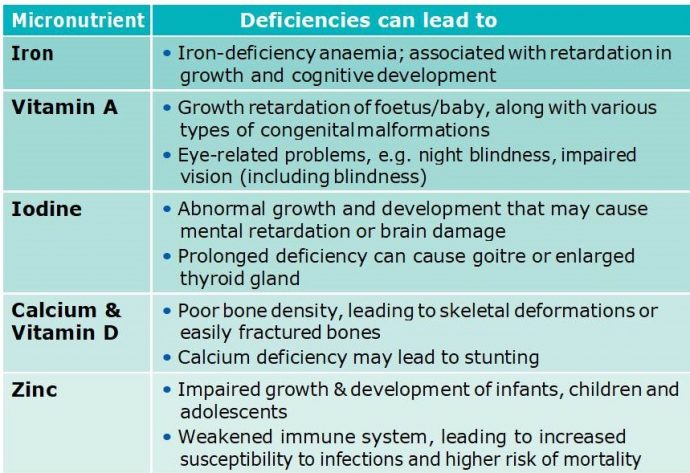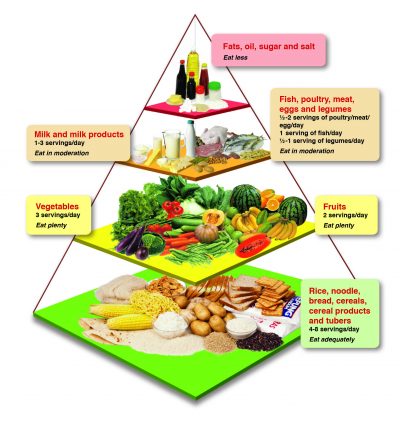Malaysia is regarded as a food haven by many, yet would you believe that micronutrient deficiencies exist?
Yes, micronutrient deficiencies, which is a form of malnutrition, persists especially among women and children. Hence, it is very important to recognise these deficiencies and take steps to prevent them.
Malnutrition refers to either overnutrition or undernutrition. Overnutrition can easily happen due to overeating, leading to excessive energy intake and paving the way to obesity. Undernutrition generally refers to an insufficient intake of food, leading to insufficient intake of energy, protein and micronutrients. As a consequence, the child can suffer from impaired growth and development (reflected as underweight, stunting, or wasting) as well as micronutrient deficiencies.
According to Dr Tee E Siong, a nutritionist, micronutrient deficiencies, caused by insufficient intake of vitamins and/or minerals, usually occur gradually. Although these deficiencies happen more frequently among undernourished children, it is important to note that healthy looking children may also be deficient in some micronutrients as well. “This makes it tricky to pinpoint as anyone, even someone who is obese, could suffer from micronutrient deficiencies. The fact that your child has a full belly is meaningless if you fail to provide him with a healthy diet, as it would mean that his body is still ‘hungry’ for nutrients – this is why micronutrient deficiency is often referred to as ‘hidden hunger’,” reveals the President of the Nutrition Society of Malaysia (NSM).
What are micronutrients?
Micronutrients are nutrients that our bodies only require in small quantities, in milli- or microgram amounts. They include:
- major minerals (i.e. calcium, sodium, potassium, phosphorus) and trace minerals (e.g. iron, iodine, zinc, selenium)
- vitamins (several B vitamins, C, A, D, E, K)
Nutritionist Dr Roseline Yap highlighted that the consequences of micronutrient deficiencies in children can be devastating, yet are often not picked up until irreversible damage has been done. This is because, by the time the effects become visible, the damage to the child’s growth and development has already happened.
Research links micronutrient deficiencies with the decline of cognitive and motor development. A child’s ‘vulnerability’ to micronutrient deficiency is not limited to early life, but also extends right up to adolescence. Thus, parents need to take extra care that their children do not suffer from ‘hidden hunger’.
The situation in Malaysia
Dr Roseline highlighted that Malaysia has seen an increase in the prevalence of overweight and obesity over the years, including among children. However, the prevalence of undernutrition problems such as insufficient intake of energy and other nutrients, including micronutrients still occur among certain segments of the community, more specifically, the lower socio-economic tier.
“The South East Asian Nutrition Survey (SEANUTS) Malaysia was a study on Malaysian children. The results were worrying as it revealed that micronutrient deficiencies such as iron, vitamin D and calcium were detected in Malaysian children. In addition, as many as a third of the children failed to achieve the recommended intakes for these micronutrients,” the NSM Hon. Treasurer discloses.
She added that although the prevalence of undernutrition is lower when compared to other Asian countries, but poor growth such as stunting and underweight are still prevalent among the Malaysian children, as well as micronutrient deficiencies namely anaemia, vitamin A deficiency, and vitamin D insufficiency. She stressed that such findings should be taken seriously and specific interventions should be implemented to curb with these micronutrient deficiencies.
Why micronutrients deficiencies occur?
So how and why do deficiencies occur in a land of regarded as a food haven? There are several possible causes:
- Lack of knowledge. Parents/caregivers are unaware of the importance of nutrition, hence failing to provide their children with nutritious foods.
- Filling his stomach with unhealthy foods. High energy-dense foods, which are high in dietary fat or high in refined carbohydrates/sugars are usually low in micronutrients. These foods will fill his tummy, but is a poor choice because it only provides energy but will starve his body of the important nutrients especially micronutrients that he needs.
- Frequently eating out. While home-cooked meals are the best option, busy parents may sometimes have to resort to eating out. Quite often, outside foods are unhealthy due to excessive use of fats/ oils, salt, and sugar.
Results from the 2017 National Health and Morbidity Survey (NHMS) of Malaysia on adolescent health revealed that only 1 in 3 adolescents consumed breakfast, 6 out of 10 ate lunch away from home, and 1 in 5 ate home-cooked food during recess time in school. In addition, 1 in 3 adolescents have reported that their choices of foods are influenced by social media such as YouTube, Facebook, and Instagram. Hence, this behaviour or influence may lead in consuming unhealthy foods resulting to micronutrient deficiencies.
“The bottom line is that parents need to consistently examine what they are feeding their kids. There has to be more awareness of what goes into their children’s bodies – a full belly does not mean that they are getting the nutrition they need, especially if unhealthy foods are provided,” Dr Tee warns.
The consequences of micronutrient deficiency
Insufficient intake of micronutrients can potentially have a big impact on a child’s healthy growth and development, especially if it occurs during the crucial growing years. The effects of micronutrient deficiencies are not noticeable in the beginning but consequences will gradually build up over time resulting in physical symptoms or clinical signs. Worst of all, by the time it becomes obvious, which are shown in the symptoms, the damage has already been done. Some of these effects/ consequences are irreversible such as stunting or under- developed cognitive functions of the child.
In Malaysia, the following are several micronutrient deficiencies that have been identified to affect children:

Therefore, it is crucial for your child to receive the right nutrition from young, ensuring optimal physical and mental development, and long term health of your child.
How can you prevent it?

Dr Tee cautions parents against making a habit of providing their kids with unhealthy meals that have little to no nutrition or imbalanced in nutrients. The usual suspects are sugar-rich foods/drinks, processed foods and snacks that contain a high content of fat, salt or flavouring (e.g. French fries, potato chips, various extruded snacks), deep fried snacks, hot dogs, burgers. He emphasised that it is imperative for parents to learn the basics of healthy nutrition – ignorance is certainly not bliss.
To start off, parents should look into the following:
Learn the basics of a healthy diet. This can be achieved with simple guides such as the Malaysian Food Pyramid as a guide for your daily food intake. Another useful concept to follow is BMV, namely balance (include foods from all five food groups in the Malaysian Food Pyramid in your daily diet), moderation (stick with moderate portions that follow the recommended number of servings per food group), and variety (include a variety of foods from each food group).
Dr Tee suggested that parents:
- Provide their child with a balanced and varied diet that includes fruits and vegetables, especially when eating out.
- Use the Malaysian Healthy Plate as a guide to the correct amounts of the main food items to be consumed in a meal.
- Keep him sufficiently hydrated with water while minimising the intake of sugary drinks.
- Provide healthy snacks and minimise unhealthy options such as pizzas, pastries, cakes, French fries, sausages, hot dogs, etc.
- Make as much effort as possible to provide him with balanced home-cooked meals at least once a day.
- Variety is the name of the game, so try cooking or ordering different dishes every day.
- When eating out, avoid foods high in fat, sugar or salt and opt for steamed, braised, baked, boiled, or grilled foods.
By following these basics, you will be well on your way to provide your child the necessary nutrients he will need. Dr Tee also suggested providing nutrient-dense foods such as milk for growing children. Milk and dairy products are a rich source of various nutrients, especially calcium and protein. Allowing your child to play outdoors is also a great way to get Vitamin D, which his body can synthesise when exposed to sunlight.
Address picky eating. Find alternative ways of incorporating foods that he dislike into his meals. Citing milk as an example, Dr Roseline commented that some kids may dislike the smell or the taste of milk. As long as your child is not allergic or intolerant to it, you can incorporate it in his diet in many different ways. The simplest way is to make milk smoothies added with fruits for him. Milk can also be added to many recipes as a replacement or an extra ingredient, e.g. making scrambled eggs with milk, replacing coconut milk with dairy milk in recipes, using milk when making pancakes/pudding, or adding it to chicken/ mutton stew. If you suspect that your child is allergic to milk protein, consult a specialist in allergy and immunology to learn how to handle it while still providing him with the nutrients he needs.
Ensure he takes more fruits and vegetables. We all know about the health benefits yet many kids refuse to eat vegetables. Dr Roseline suggested using the simple ‘trick’ of blending and combining vegetables with other ingredients to make meatballs or homemade burger patties. These home-made options are a healthier option compared to store-bought nuggets, burgers, sausages, or meatballs. You can make your own concoction by mixing and blending poultry or meats with vegetables. Alternatively, vegetables can be finely chopped and combined with a little salad dressing to make it tastier.
Do it right from the start
Datuk Dr Zulkifli Ismail, Chairman of the Positive Parenting Programme, warned parents against relying on supplements instead of a healthy diet to meet their child’s nutritional needs, saying “A proper diet should adequately meet a child’s nutritional requirements, so channel your time and efforts into making sure he eats properly. Supplements may be useful for short-term usage, particularly if his diet has been affected by an illness – however, do consult his doctor or paediatrician beforehand.”
He then added that parents have the responsibility to ensure that their children get enough micronutrients from their diet, saying “There should be some urgency for parents to take prompt action. After all, there is only a small window of opportunity to provide adequate nourishment that promotes a child’s optimum growth and development. If this window is missed, it will ultimately lead to deficiencies which can become serious and irreversible.” So, parents take note of your child’s nutritional needs. Start reading up on nutrition as much
as possible in order to provide him with the right foods that he needs to grow up healthy and strong.







Comments